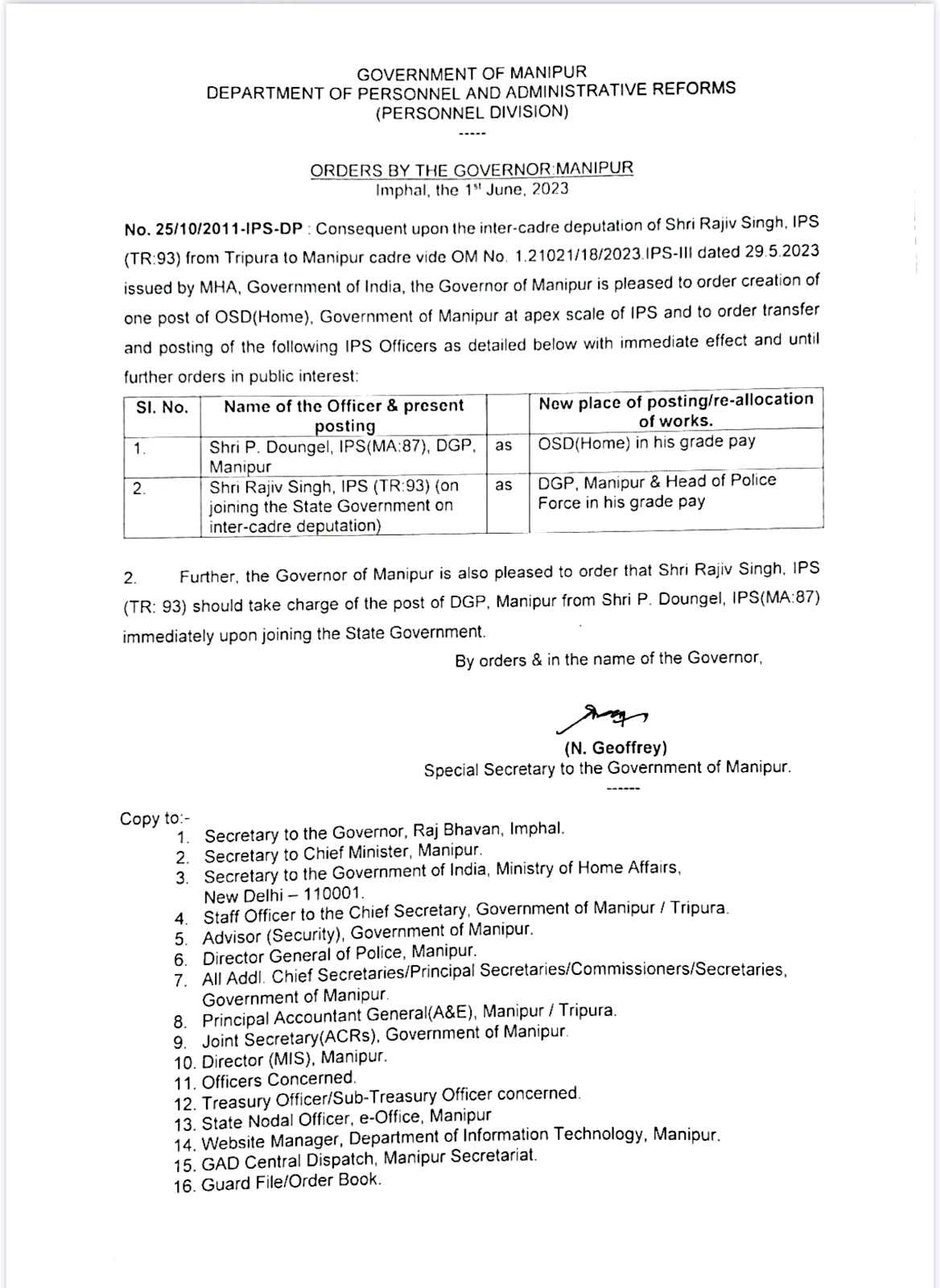New Delhi
The newly appointed DGP of Manipur Rajiv Singh, otherwise a Tripura cadre officer, was on Tuesday summoned by the Supreme Court in connection with various heinous crimes and continuous ethnic strife in the northeastern state.
"In order to help the Court to determine the nature of investigation, we direct the DGP Manipur to be personally present on Monday, August 7, in the Supreme Court to aid the Court," the order said.
The court also wanted to know if any erring policeman has been arrested. "Did the DGP care to find out in all these months? What has he done?"
"Based on the preliminary data, it prima facie appears that investigation has been tardy with considerable lapse between occurrence and the registration of the FIR, recording of witness statements and arrests have been few and far between," the order said.
Rajiv Singh, a 1993 batch IPS officer of Tripura cadre, replaced P. Doungel as the DGP after Union Home Minister Amit Shah visited the violence-hit Manipur.
Singh has had vast experience in anti-militancy operations in Tripura as well as Maoist problems in Jharkhand as he had once been posted as the CRPF IG of that region.
The three-member bench of Chief Justice D Y Chandrachud and Justices J B Pardiwala and Manoj Misra mooted formation of a judicial committee comprising retired judges to examine the allegations and cases.
"We may think of eventually, based on the data, we were thinking of constituting a committee of former judges of the High Court," it said."It will be a broad based committee. First we will decide on the remit such as relief, compensation, rehabilitation, to ensure the investigation is fair, recording of section 164 statements irrespective of where the victims are. Many have left Manipur.
We are inclined to form a committee," the Court remarked.
The bench asked Solicitor General Tushar Mehta to take instructions on who should probe the cases.
During Tuesday's hearing, similar to July 31 (Monday), Chief Justice Chandrachud continued his hard-hitting comments and questioning on Manipur violence.
At one point during Tuesday's hearing, CJI said, "that means that the situation was so bad for two months that it was not conducive for FIRs. There was no law, you couldn't even register an FIR, police couldn't arrest."
"This gives us the impression that from the beginning of May till the end of July there was no law. There was absolute breakdown of machinery that you could not even register FIR," CJI said.
"Does it not point to the fact that there is a complete breakdown of law and order and machinery of the State?"
Solicitor General Tushar Mehta said, "I am resisting myself from saying anything- why coordinated attacks happened etc- the moment we realised, we transferred (the case) to CBI."
Justice Chandrachud countered sharply, "What about the balance? Say about 50 go to CBI, what about the 5500 then? State police are incapable of investigating. There is no law and order left."
CJI, however, said - that the court's approach is irrespective of whoever has committed the offence. "Offence is an offence regardless of who the victim or perpetrator is", sources said.
The apex court was told that the Manipur government has lodged 6,523 FIRs after ethnic violence erupted.
On the request of Solicitor General Mr Mehta to keep the matter for Monday (August 7), the Supreme Court ordered that the Manipur DGP should remain personally present before the court (on Monday) at 2 pm.
The SG also said, "250 arrests have been made and 12,000 arrests as preventive measures."
The Supreme Court then questioned, "Have any arrests been made of the police? Did the DGP care to find out in all these months? What has he done?"
"It is his duty. Did they interrogate the police officers?" -- the court asked.
ends
Chief Justice D Y Chandrachud ....continues his hard-hitting comments and questioning on Manipur violence
At one point in Tuesday's hearing, CJI D Y Chandrachud says, "that means that the situation was so bad for two months that it was not conducive for FIRs. There was no law, you couldn't even register an FIR, police couldn't arrest."
"This gives us the impression that from the beginning of May till the end of July there was no law. There was absolute breakdown of machinery that you could not even register FIR," CJI said.
"Does it not point to the fact that there is a complete breakdown of law and order and machinery of the State?"
Solicitor General Tushar Mehta said, "I am resisting myself from saying anything- why coordinated attacks happened etc- the moment we realised, we transferred to CBI."
Justice Chandrachud countered sharp, "What about the balance? Say about 50 go to CBI, what about the 5500 then? State police is incapable of investigating. There is no law and order left."
CJI, however, said - that the court's approach is irrespective of whoever has committed the offence. "Offence is an offence regardless of who the victim or perpetrator is".
The apex court was told that the Manipur government lodged 6,523 FIRs after ethnic violence erupted.
On the request of Solicitor General Mr Mehta to keep the matter for Monday (August 7), the Supreme Court ordered that the Manipur DGP should remain personally present before the court (on Monday) at 2 pm.
The SG also said, "250 arrests have been made and 12,000 arrests as preventive measures."
The Supreme Court then questions, "Have any arrests been made of the police? Did the DGP care to find out in all these months? What has he done? It is his duty. Did they interrogate the police officers?"









No comments:
Post a Comment